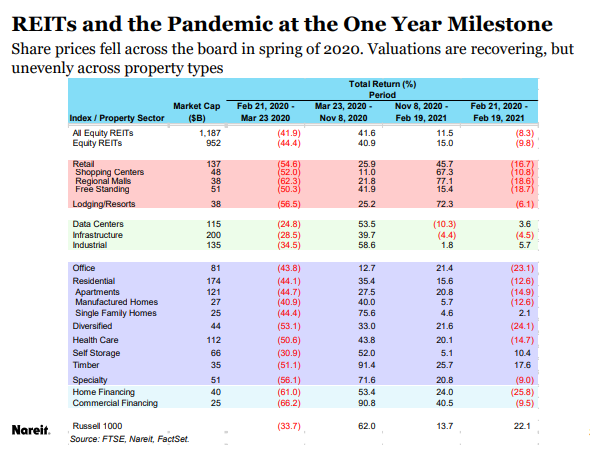On March 10, 2021, the National Association of Realtors held its virtual Real Estate Forecast Summit: Commercial Update event, which presented an analysis of the impact of COVID-19 on commercial real estate and the outlook for the market moving forward.
The summit featured a panel of economists specializing in real estate moderated by Akiko Matsuda, a reporter with The Real Deal.
Panelists included:
· Calvin Schnure, Senior Economist, Nareit
· Lawrence Yun, Chief Economist, National Association of Realtors
· Brandon Hardin, Research Economist, National Association of Realtors
· Gay Cororaton, Senior Economist and Director of House & Commercial Research, National Association of Realtors
Schnure discussed the state of commercial real estate and REITs one year into the COVID-19 pandemic. He referenced Nareit’s recent T-Tracker report to show how different sectors of the REIT market are experiencing recovery.
“We are seeing signs that overall commercial real estate is beginning to recover, but it is an uneven recovery,” said Schnure.
Schnure discussed that while sectors like retail and lodging/resorts were hard hit by the pandemic and their FFO is still well below where it was in 2019, sectors that support the digital economy – data centers, infrastructure, and industrial – have seen a surge in business activity in the past year. The remaining sectors - office, residential, diversified, self-storage, health care, and specialty – showed substantial gains in the fourth quarter of 2020, recuperating nearly half of the losses sustained in the first and second quarters.
Looking ahead, Schnure says that in the medium-term, the rollout of the vaccine will have a positive impact on retail and lodging/resorts as life returns to normal.
However, there are still some more long-term questions related to how the pandemic impacted the competition between brick-and-mortar retail and e-commerce and how work from home will impact the office sector.
“A lot of people are concerned about the potential longer-term impact of work from home and if that going to reduce the demand for office space,” said Schnure.
The data suggests that it has had a greater impact in large, gateway cities with workers relocating to smaller, secondary cities during the lockdown. He stressed, however, that we do not know if this is permanent. There is evidence that people are moving back to larger cities.
A recording of the summit as well as all the panelists’ presentations can be found here .
